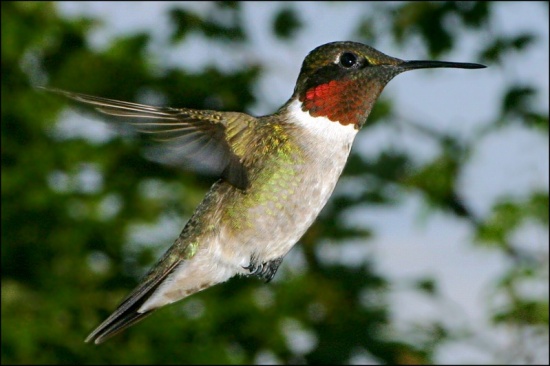(Picture of female. Attempt to disguise some copied text. Referenced) |
|||
| Line 1: | Line 1: | ||
| + | [[Image:Ruby-throated_Hummingbird.jpg|thumb|550px|right|Photo by {{user|etow|etow}}]] | ||
;[[: Category:Archilochus|Archilochus]] colubris | ;[[: Category:Archilochus|Archilochus]] colubris | ||
| − | |||
==Identification== | ==Identification== | ||
| − | 3 1/2" (9 cm). Needle-like bill, metallic green above, white below, buff sides, white-tipped outer tail feathers, brilliant, iridescent red throat which females and immature males lack. Averages shorter-billed and longer-tailed than [[Black-chinned Hummingbird]] with wing tip straighter and narrower. | + | 3 1/2" (9 cm). Needle-like bill, metallic green above, white below, buff sides, white-tipped outer tail feathers, brilliant, iridescent red throat which females and immature males lack. |
| − | + | ====Similar Species==== | |
| + | Averages shorter-billed and longer-tailed than [[Black-chinned Hummingbird]] with wing tip straighter and narrower. | ||
==Distribution== | ==Distribution== | ||
| + | [[Image:040409RTHummer2a.jpg|thumb|350px|right|Photo by {{user|KCFoggin|KCFoggin }}<br />Female <br /> | ||
| + | Myrtle Beach, [[South Carolina]], [[USA]] April 2009 ]] | ||
Southern [[Canada]] and [[USA]]; winters to [[Central America]] and rarely to the [[Caribbean]]. | Southern [[Canada]] and [[USA]]; winters to [[Central America]] and rarely to the [[Caribbean]]. | ||
| − | |||
==Taxonomy== | ==Taxonomy== | ||
This is a monotypic species. | This is a monotypic species. | ||
==Habitat== | ==Habitat== | ||
Suburban gardens, parks, and woodlands. | Suburban gardens, parks, and woodlands. | ||
| − | |||
==Behaviour== | ==Behaviour== | ||
| − | 2 white eggs are laid in a nest woven | + | ====Breeding==== |
| − | + | The 2 white eggs are laid in a nest which has been woven from soft plant material. It is held together with spider silk and then covered with lichen. | |
| + | ====Diet==== | ||
The diet includes nectar, but Ruby-throated Hummingbird can also be seen taking insects and tree sap from woodpecker (sapsucker) drilling and insects taken in flight. | The diet includes nectar, but Ruby-throated Hummingbird can also be seen taking insects and tree sap from woodpecker (sapsucker) drilling and insects taken in flight. | ||
| + | ==References== | ||
| + | #What Bird | ||
| + | #eNature | ||
==External Links== | ==External Links== | ||
{{GSearch|Archilochus+colubris}} | {{GSearch|Archilochus+colubris}} | ||
[[Category:Birds]][[category:Archilochus]] | [[Category:Birds]][[category:Archilochus]] | ||
Revision as of 10:06, 5 April 2009

- Archilochus colubris
Identification
3 1/2" (9 cm). Needle-like bill, metallic green above, white below, buff sides, white-tipped outer tail feathers, brilliant, iridescent red throat which females and immature males lack.
Similar Species
Averages shorter-billed and longer-tailed than Black-chinned Hummingbird with wing tip straighter and narrower.
Distribution
Southern Canada and USA; winters to Central America and rarely to the Caribbean.
Taxonomy
This is a monotypic species.
Habitat
Suburban gardens, parks, and woodlands.
Behaviour
Breeding
The 2 white eggs are laid in a nest which has been woven from soft plant material. It is held together with spider silk and then covered with lichen.
Diet
The diet includes nectar, but Ruby-throated Hummingbird can also be seen taking insects and tree sap from woodpecker (sapsucker) drilling and insects taken in flight.
References
- What Bird
- eNature




